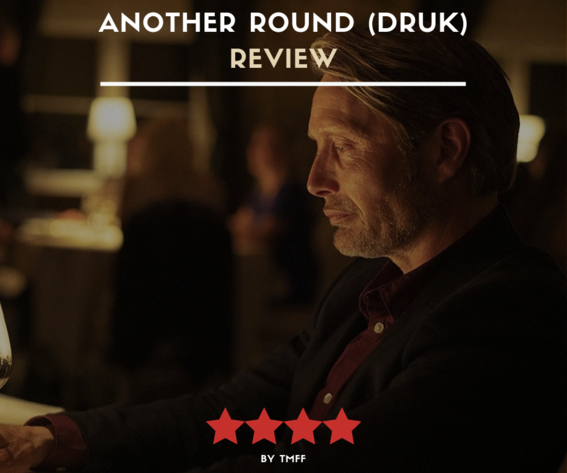Another Round (Druk) was written and directed by Thomas Vinterberg, the man behind The Hunt – one of my all-time favourite films. It recently won an Oscar for the Best International Feature of last year, a feat surprisingly not accomplished by his previously mentioned masterpiece. Does this mean that it’s an even better film? Well, not really – and anyways, it would perhaps not be fair to compare the two. The Hunt is a much darker social drama, whereas The Hunt, while also exhibiting a dark side from time to time, primarily sticks to a humorous and celebratory mood. Another Round takes a look at mid-life crisis, and brings this into a context of alcohol consumption, as a celebration of life. And on that topic, the film is dedicated to Thomas’ late daughter, who died a few years back in a car accident.
Another Round centres around a group of four friends – all of them middle-aged teachers at a small high school in Denmark. The four are certainly no alcoholics, meaning they don’t drink more than average in Denmark, which, granted, is quite a lot. However, they don’t just share a profession and age, but also discontent – they seem to be at a stage where they are no longer excited about their jobs, and this disenchantment means they often have zero enthusiasm when teaching. At a friendly get-together, one of the teachers mentions an academic paper which states that human beings are born with a blood alcohol shortfall of 0,05%, meaning that should they achieve and maintain such a level, they would be met with enhanced creativity, inspiration and social courage. In the end, the four of them agree to undertake a practical experiment of this hypothesis, in order to test out its validity.
❝The film does not attempt to pass on moral judgement with its ending.❞
What is primarily great about how Another Round delves into its proposed subject relates to its stance on alcohol consumption, as it takes the middle ground in this debate. It by no means glorifies the consumption of alcohol, but instead shows its social apport within Danish culture, and even larger scales – Scandinavian, European and beyond. By exploring a couple of political personalities’ relationship with alcohol in a funny montage, Vinterberg manages to quickly universalise the theme, and make it very relatable. However, neither does it shun alcohol as something inherently bad, but instead makes its negative effects clear if over-consumption is in the question. Plus, with a very symbolic history lesson, the film shows that alcohol consumption is not always a great predictor of good nature or skill.
Another Round is not only a film about alcohol, instead also delving into subjects such as professional satisfaction, marriage and camaraderie. All of these are very universal themes, and the character dramas that the four teachers are confronted with are never really out of this world. As believable as the main character’s drama was in The Hunt, the dramas on display here seem even more relatable through their ordinary angle. There are no antagonists in the film, no inherent ‘quests’ for the characters, and ultimately this is what makes the film so thematically tangible. There are funny moments as well as sad moments, the characters are confronted with both success and tragedy, and this structured balance is what makes the film so great, despite the rather predictable gradual spiral that the alcohol experiment descends into. And the great thing is that the film does not attempt to pass on moral judgement with its ending, but instead paints life in a light that should be cherished and appreciated for what it is, always making the best of each situation.
Of course, I could talk more about how well paced the film is, how Vinterberg’s direction flows almost flawlessly (no wonder he also got nominated for Best Director), and how Mads Mikkelsen especially completely nails his role, once again showing his acting prowess. But ultimately, in the case of Another Round, it’s how these individual elements gel together and interact with one another that really makes the film come alive. And the best way to observe this interaction is to watch the film – which you definitely should do.










Leave a reply